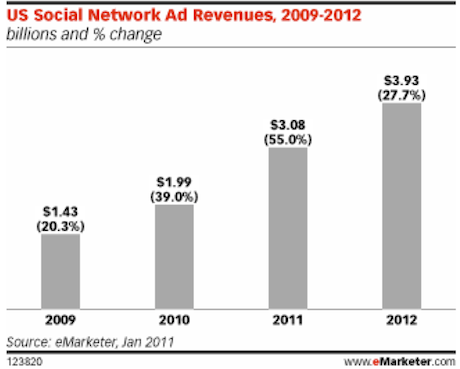Facebook Ads & Search: When Worlds Collide
Who should advertise on Facebook? Is Facebook more like search or display management? And how can you judge Facebook performance relative to other media channels?
Who should advertise on Facebook? Is Facebook more like search or display management? And how can you judge Facebook performance relative to other media channels?
The rise of Facebook ads is having a profound impact on the performance marketing ecosystem. Facebook is now the most visited website in the U.S., with more visits than Google, according to Experian Hitwise. The social network is also projected to take in more than $2 billion in advertising revenue in 2011, according to eMarketer.

As Facebook becomes a bigger platform for advertisers, more players are emerging to help marketers make sense of how to use this new form of advertising most effectively.

Advertising on Facebook looks and feels a lot like search and performance-based display. It’s biddable on a CPC or CPM basis, and can be targeted to specific audiences. Marketers can choose how much to bid for specific audience segments and based on their ROI goals.
Click-through rates (CTRs) on Facebook have been widely discussed, with some reporting better results than seen with some types of display, but not nearly as strong at CTRs witnessed on search.
This leads to a few basic questions for search marketers: Is Facebook more like search or display advertising? Who should advertise on Facebook? How do I judge Facebook performance relative to other media channels?
1. Who Should Advertise on Facebook?
This is an easy question to answer on the face of it: Everyone should advertise on Facebook. Just like paid search, you only show your ads to your target audience and only pay when they click on your ad.
Why wouldn’t a company choose to advertise on Facebook? There are legitimate reasons and most revolve around effort versus reward tradeoffs.
Based on your demographic or geographic targeting, the number of customers generated on Facebook might not be worth the effort. Lots of work goes into successful Facebook campaigns, so scale is important to making the effort worthwhile.
To make the most of your campaigns, both your audience and your ad creative and messaging need to be hyper-targeted. Creating highly targeted messages across many segments takes a lot of upfront work and ongoing maintenance.
Thankfully, Facebook lets you know how large your audience will be based on your targeting parameters, so you can decide upfront whether it warrants your effort and dollars to test it out.
2. Facebook Management — Search or Display?
We often talk about optimization of search, display, and social media from a technological perspective. Very little is talked about how this is managed by people.
Historically, search marketers have managed media based on their intimate knowledge of the search engines and biddable advertising. Now, search marketers are increasingly being asked to apply this knowledge and experience to display and even Facebook.
Therefore, 2011 promises to be a year where advertisers and agencies adapt to this evolving landscape and respond by building on departments that focus on ‘biddable media’ and centralized ‘performance media’. Some will choose to bolster their internal capabilities, while others will look outside to performance-based media companies who bring that expertise to the table.
Creating efficiencies within your team is just as important as optimizing your media. As search and display converge, Facebook will take the (growing) middle seat. The search marketer can help display and exchange specialists under the concepts of auction-based media.
Vice versa, display people can help search specialists with dynamic creative and understanding of networks and exchanges. The Facebook marketer is right in the middle, and all media buyers can be helping each other adapt to this converging ecosystem.
3. How Do You Judge Facebook Performance Relative to Other Media Channels?
Media attribution is key to understanding how Facebook performs and compares to other channels. This is where the old axiom “you can’t manage what you can’t measure” comes into play.
Facebook campaigns can play an important part in the conversion process, but clicks on Facebook ads don’t always occur at the end of the purchase funnel. It is critical, therefore, to have a proper multi-exposure attribution system that rewards all media that assists in the eventual purchase.
Most marketers are still attributing their performance to the last click, thereby over-allocating budgets to undeserving media and even overpaying for conversions.
The ability to easily optimize, track, and attribute Facebook and other media in a single platform will potentially drive significantly more media to Facebook in the coming quarters.
What is Facebook good for, and how does it drive awareness, action and conversion? These questions are best answered when looking at Facebook as part of a media mix that is centrally managed and tracked.
Summary
Facebook is an exciting and fast-growing ad channel that is becoming a critical part of major marketers’ media mix. Search marketers have insights, knowledge, and experience that make them well-prepared to tackle this medium while it’s just getting started.
As convergence continues across performance-based biddable media, there’s little doubt that search marketers will be asked to take a bigger seat at the media table.
Join us for SES New York 2011, the Leading Search & Social Marketing Event, taking place March 21-25. SES New York will be packed with 70+ sessions, multiple keynotes, 100+ exhibitors, networking events, and parties. Learn about PPC management, keyword research, search engine optimization (SEO), social media, local, mobile, link building, duplicate content, multiple site issues, video optimization, site optimization, usability, and more.